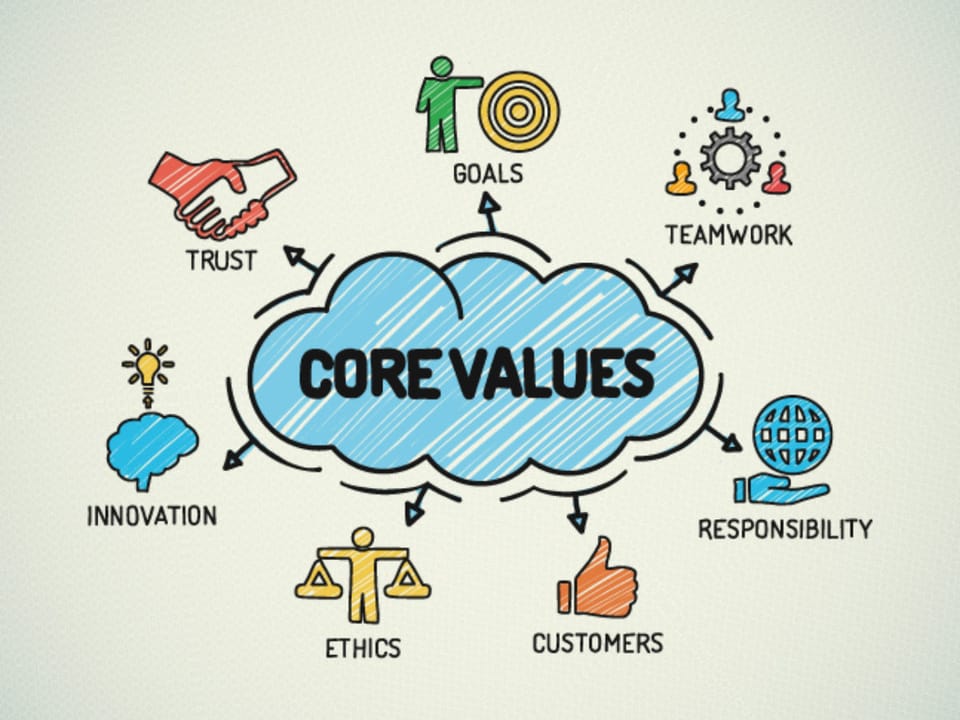Organizational values are a pragmatic tool for leaders

How can leaders use their organization’s values as a pragmatic tool, to enhance their day-to-day impact?
Over the last couple of days, I reviewed an interview transcript of a conversation I had with a senior leader a few years ago. This person was experienced, and also quite savvy and thoughtful about how they led others. Over and over during the conversation they returned to the theme of linking with organizational values. This caught my attention since I can imagine many leaders might view their company’s values as abstract, conceptual entities that float around in the clouds and on rarely seen PPT slides, yet don’t provide that much value to them in their working lives.
This leader refuted that perspective. They suggested several very insightful ways that referencing, or ‘linking’ with organizational values, can be pragmatic and useful:
- Meaning making: Values provide a way to explain the rationale for decisions, the leader’s thinking, or challenges issued from the leader, in a way that can enhance alignment. “Why did I or we decide to do this? Let me share my thinking and how it aligns with our values as an organization.”
- Informing situational leadership: It’s now a truism to say that leaders need to adjust their behaviour to suit the situation, or to the people they’re interacting with. Referencing values can help leaders by informing how they should adjust, flex, or adapt their behaviour. Checking in with and ensuring a linkage to the organization’s values can illuminate a range of behavioural choices a leader could make (and some they shouldn’t make), in any given situation.
- Behavioural consistency: Referencing and then linking with organizational values can also ensure the leader remains consistent in their behaviour, something team members usually appreciate.
- Buffering a challenge: When a leader challenges others to strive for a higher level of performance, the receiver might wonder why they should extend themselves to reach that goal. Or they might perceive the challenge more as a threat, than a nudge to achieve more. Providing rationale for the challenge, in a way that links with organizational values, can help the challenge seem more palatable.
One practical suggestion based on this theme, is that leaders should educate their teams about the organization’s values, so that when the leader references them, the team understands and resonates with the language.
So while organizational values seem conceptual and hard to apply, they can be a useful pragmatic tool that leader can use (often) to build alignment.
Music
One of my favourite artists, virtuoso Brian Eno. I mostly listen to his ambient music, but I really enjoy this song as well. This one feels like an ode to big picture, long term thinking. "One day, we will put it all behind/We'll say that was just another time/We'll say that was just another day on earth."
Tim Jackson, Ph.D. is the President of Jackson Leadership Inc., and a leadership expert with 18 years of experience assessing and coaching executives in service of increasing their effectiveness. He has worked with leaders across a variety of sectors, including agriculture, chemicals, consumer products, finance, logistics, manufacturing, media, not-for-profit, pharmaceuticals, healthcare, and utilities and power generation, including multiple private-equity owned businesses. He has also worked with leaders across numerous functional areas, including sales, marketing, supply chain, finance, information technology, operations, sustainability, charitable, general management, health and safety, and quality control, and across hierarchical levels from individual contributors to CEOs. Tim has also worked with leaders across Canada, the US, Western Europe, and China.
Tim has published his research and ideas on leadership in various outlets, including Forbes.com, The Globe and Mail, peer-reviewed journals, and several HR trade magazines. He also writes about leadership topics often in his newsletter at www.timjacksonphd.com. He has also shared details of his coaching practice at leading conferences like the Society for Industrial and Organizational Psychology (SIOP).
He has a Ph.D. in Industrial/Organizational Psychology from The University of Western Ontario, and is based in Toronto, ON.
Tim's services:
- In-depth executive assessment, feedback, & goal setting: Tim uses interview-based 360 surveys to conduct in-depth, customized assessments of executives, often in combination with personality testing, and uses that data to provide practical feedback on improving leadership impact.
- Executive coaching: Often following an in-depth assessment, Tim uses his accumulated knowledge from a career of researching and working with leaders, to provide one-to-one coaching for executives to help them strengthen their effectiveness.
- Workshops: Tim offers two customized workshops for executive audiences. The first is titled 'How leaders can challenge, push, and pull teams to the limit of performance, without breaking them.' This content is based on Tim's original research, using data from 37 executive interviews. The second workshop is titled 'Foundational leadership concepts for new executives,' and summarizes all the key drivers and derailers of leadership effectiveness that Tim has learned about in his 18 year career, distilled from both academic sources and practical experience.
- Leadership circles: Tim facilitates groups of executives in discussing similar leadership challenges, asking them to share experiences, solutions, advice, and support for one another. These circles help carve out dedicated time for leaders to think about development amidst pressing day-to-day demands, and are a cost effective way to involve multiple executives in a growth experience at once.
- Culture audits: Using the same in-depth, qualitative data gathering methods he uses for executive 360s, Tim conducts numerous interviews to investigate cultural friction points, so teams, functions, and organizations can address them and enhance their performance.
Please feel free to contact Tim with your feedback about this site, questions about his services, or to share your own ideas about leadership in organizations.
Email: tjackson@jacksonleadership.com
Phone: 647-969-8907
Website: www.jacksonleadership.com
Newsletter: www.timjacksonphd.com
Articles and short-form thoughts on Bluesky






Member discussion